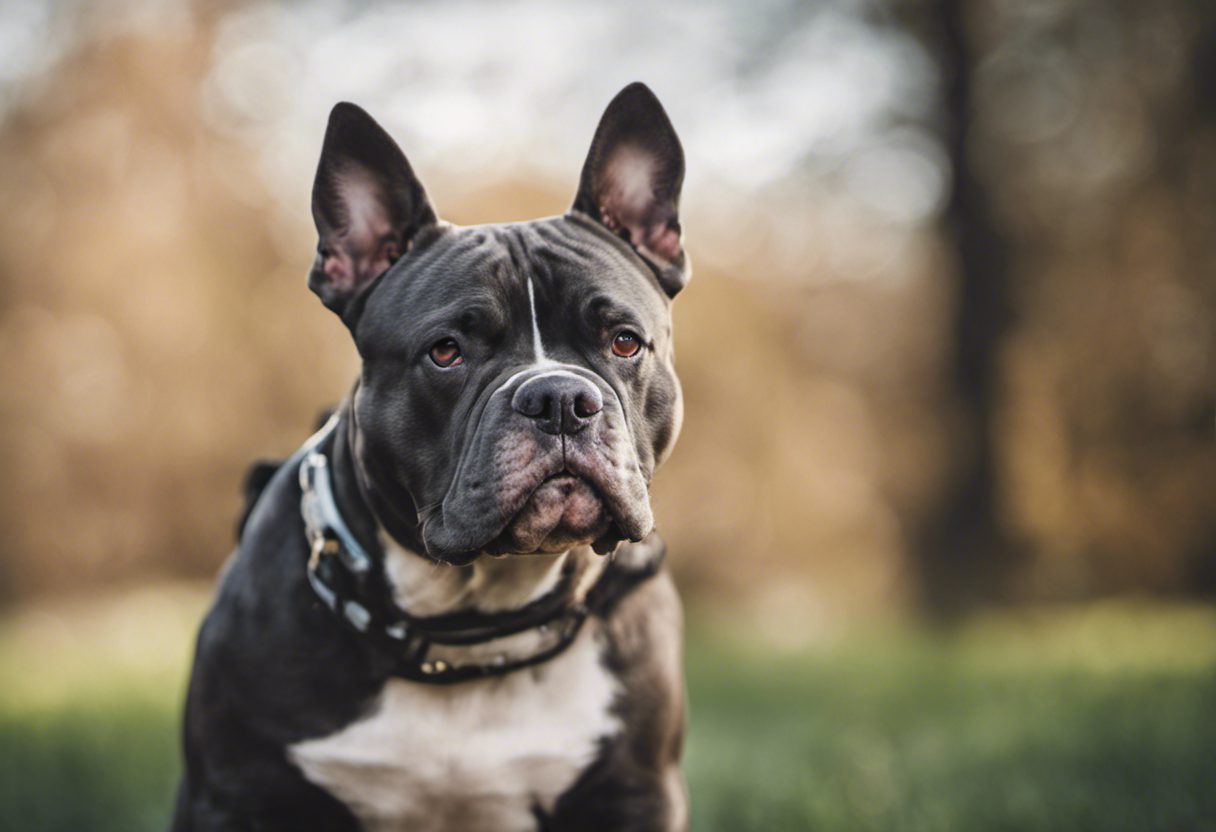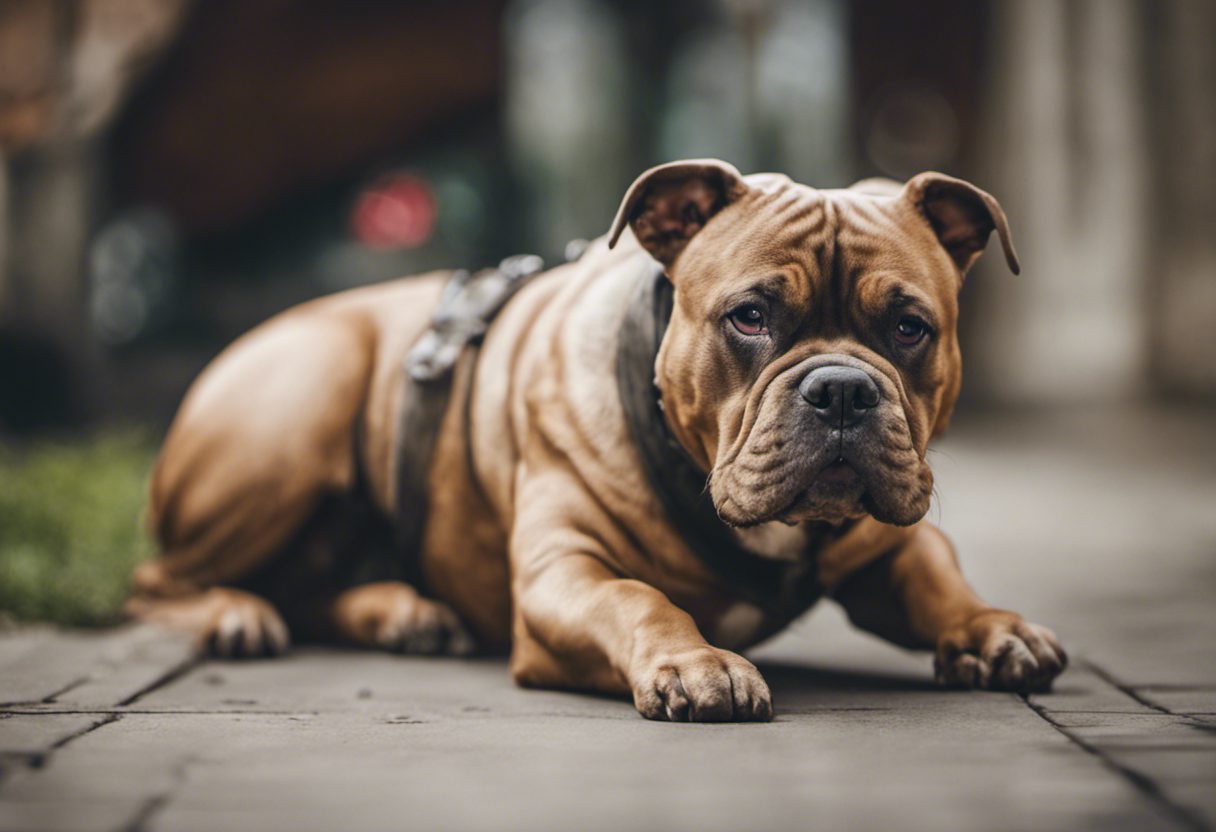Are you concerned about the health of your American Bully? Then you've come to the right place.
In this article, we will discuss common health problems that American Bullies may face, and what you can do to keep them safe.
From skin allergies to joint dysplasia, obesity, heart disease, eye problems, dental issues, breathing difficulties, and allergic reactions, we'll cover it all.
Stay informed and proactive to ensure your furry friend enjoys a healthy and happy life.
Key Takeaways
- American Bullies are prone to skin allergies, which can cause itching, redness, and irritation. Common triggers include fleas, certain foods, and environmental factors like pollen or dust mites.
- Joint dysplasia is a common health problem in American Bullies, often genetically predisposed. Preventive care measures include a balanced diet, avoiding excessive exercise, and maintaining a healthy weight. Choosing a responsible breeder who conducts health screenings is important.
- Obesity is a common issue in American Bullies and can lead to joint issues, heart disease, diabetes, and a shorter lifespan. Managing your dog's weight through a balanced diet and regular exercise is crucial.
- American Bullies may experience various eye problems such as Progressive Retinal Atrophy (PRA), cataracts, entropion, and ectropion. Regular eye examinations by a veterinarian and early intervention are important for maintaining their eye health. Good dental hygiene is also important to prevent tooth decay, gum disease, and infections. Regularly brushing their teeth and scheduling dental check-ups with a vet is recommended.
Skin Allergies
American Bullies are prone to skin allergies. These allergies can cause itching, redness, and irritation.
Common triggers include fleas, certain foods, and environmental factors like pollen or dust mites.
To protect your Bully, regularly check for fleas, provide a balanced diet, and keep their environment clean.
If you observe any signs of allergies, consult a veterinarian for diagnosis and treatment.
Joint Dysplasia
One health issue that American Bullies are prone to is joint dysplasia. This condition is often genetically predisposed, meaning that certain bloodlines may be more susceptible to it.
To prevent joint dysplasia, it's important to take preventive care measures such as providing a balanced diet, avoiding excessive exercise, and maintaining a healthy weight for your American Bully.
Genetic Predisposition
Genetic predisposition plays a role in the development of joint dysplasia in American Bullies. This condition, characterized by abnormal joint formation, can cause pain, lameness, and difficulty in movement.
To ensure the well-being of your American Bully, consider the following factors:
- Genetics: American Bullies with a family history of joint dysplasia are at a higher risk.
- Breeding: Choose a responsible breeder who conducts health screenings to reduce the chances of inheriting the condition.
Preventive Care Measures
Prevent joint dysplasia in your American Bully by taking proactive measures for their preventive care.
Regular exercise keeps their joints strong and flexible. Avoid excessive jumping or rough play that strains their joints.
Maintain a healthy weight to reduce stress on their joints. Provide a balanced diet with essential nutrients for joint health, like omega-3 fatty acids and glucosamine.
Regular vet checkups and screenings detect early signs of joint dysplasia for prompt treatment if necessary.
Obesity
Now let's talk about obesity in American Bullies.
It's important to manage your dog's weight to ensure their overall health and well-being. We'll discuss some weight management tips to help you keep your dog at a healthy weight.
Additionally, we'll explore the health risks that come with obesity and the prevention methods you can implement to keep your American Bully in optimal condition.
Weight Management Tips
To manage your American Bully's weight effectively, closely monitor their diet and exercise routine. Follow these tips:
- Diet:
- Feed a balanced and nutritious diet, avoiding excessive treats or table scraps.
- Seek guidance from a veterinarian regarding appropriate portion sizes and feeding schedules.
- Exercise:
- Engage in regular physical activities like daily walks or play sessions.
- Include mentally stimulating exercises to keep your Bully active and prevent boredom.
Health Risks of Obesity
Obesity in American Bullies can cause various health problems. These include joint issues, heart disease, diabetes, and a shorter lifespan. Excess weight puts strain on their joints, increasing the risk of arthritis and musculoskeletal problems. It also strains their heart, leading to cardiovascular issues. Additionally, obesity can result in insulin resistance and diabetes. To maintain your American Bully's health, it's important to ensure they have a healthy weight through a proper diet and regular exercise.
Prevention Methods for Obesity
Prevention Methods for Obesity
To prevent obesity in your American Bully, implement a proper diet and regular exercise routines. Here are some prevention methods to maintain a healthy weight:
- Diet:
- Feed a balanced and nutritious diet, avoiding excessive treats and table scraps.
- Measure food portions and avoid overfeeding.
- Exercise:
- Provide daily exercise such as walks, playtime, and interactive toys to keep your dog active and burn off excess calories.
Heart Disease
Signs and symptoms of heart disease in American Bullies include:
- Coughing
- Difficulty breathing
- Fatigue
- Decreased appetite
- Fainting
These could indicate underlying heart conditions such as congestive heart failure or heart murmurs.
To prevent and manage heart disease in your American Bully, it is important to:
- Schedule regular veterinary check-ups
- Provide a balanced diet
- Encourage regular exercise
- Maintain a healthy weight
Eye Problems
American Bullies may experience various eye problems that can affect their vision and well-being.
Some common eye problems in American Bullies include inherited conditions like Progressive Retinal Atrophy (PRA) and cataracts. These conditions can cause progressive vision loss and may eventually lead to blindness if left untreated.
In addition to inherited conditions, American Bullies may also develop eyelid abnormalities such as entropion and ectropion. Entropion is a condition where the eyelid rolls inward, causing the eyelashes to rub against the cornea. Ectropion, on the other hand, is when the eyelid droops or turns outward, exposing the inner surface of the eyelid.
To ensure the safety and comfort of your American Bully, it's important to have regular eye examinations by a veterinarian. Early detection and management of these conditions can help prevent further damage and provide appropriate treatment options for your dog.
Regular eye examinations can help identify any underlying issues and allow for timely intervention. This can include prescribing medications, performing corrective surgery, or providing other forms of treatment to alleviate discomfort and maintain your American Bully's eye health.
Dental Issues
Be aware of dental issues in your American Bully as they can affect their health. Poor dental hygiene can cause tooth decay, gum disease, and infections.
Regularly brush your dog's teeth and give them chew toys to keep their teeth clean.
Schedule dental check-ups with your vet for early detection and treatment to prevent complications.
Breathing Difficulties
If your American Bully is having trouble breathing, it's crucial to immediately seek veterinary attention. Breathing difficulties can indicate a serious underlying health issue. Look out for the following signs:
- Rapid or shallow breathing
- Wheezing or coughing
- Excessive panting
- Gagging or choking
These symptoms may be caused by respiratory infections, allergies, or a collapsed trachea. Prompt veterinary care is essential for diagnosing and treating the problem to ensure your dog's safety and well-being.
Allergic Reactions
Pay attention to signs of allergic reactions in your American Bully. Allergies can manifest as skin rashes, itching, sneezing, and difficulty breathing.
Common allergens for dogs include certain foods, pollen, dust mites, and fleas. Consult your veterinarian if you notice any unusual symptoms. They can help identify the allergen and provide appropriate treatment, such as medication or dietary changes.
Regular check-ups and a clean living environment can help prevent allergic reactions in your dog.
Frequently Asked Questions
What Are the Common Signs and Symptoms of Skin Allergies in American Bullies?
Skin allergies in American bullies can cause a range of signs and symptoms. These may include excessive itching, redness, hair loss, rashes, and sores. It's important to be aware of these issues to ensure your bully's health and well-being.
How Can Joint Dysplasia Be Managed or Treated in American Bullies?
To manage or treat joint dysplasia in American Bullies, you should consult with a veterinarian who can provide a personalized treatment plan. Options may include medication, physical therapy, weight management, and surgery if necessary.
Are There Specific Dietary Recommendations to Prevent Obesity in American Bullies?
To prevent obesity in American Bullies, it's important to follow specific dietary recommendations. Avoid overfeeding and choose a balanced diet with appropriate portion sizes. Regular exercise is also essential to keep your bully healthy and fit.
What Are the Warning Signs of Heart Disease in American Bullies?
If you're concerned about heart disease in your American Bully, watch out for warning signs such as fatigue, difficulty breathing, coughing, and fainting. These symptoms may indicate a problem and should be addressed by a veterinarian.
How Can Owners Prevent or Manage Dental Issues in American Bullies?
To prevent or manage dental issues in your American Bully, you should prioritize regular brushing, provide dental chew toys, and schedule professional cleanings. These measures are essential for maintaining your dog's oral health and preventing potential problems.






